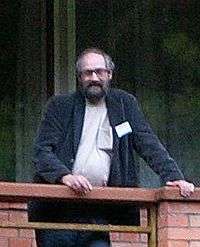Sergei Starostin
| Sergei Anatolyevich Starostin | |
|---|---|
|
Dr. Starostin on June 2, 2000 | |
| Born |
March 24, 1953 Moscow, Russian SFSR |
| Died |
September 30, 2005 (aged 52) Moscow, Russia |
| School | Moscow school, historical linguistics |
Main interests | long-range language reconstruction (especially Nostratic and Dené–Caucasian), glottochronology, accentology (especially Indo-European) |
Notable ideas | Dené–Caucasian hypothesis, reconstruction of Proto-Altaic, Proto-North-Caucasian, Proto-Yeniseian, Proto-Tibeto-Burman, Proto-Kiranti, reconstruction of Old Chinese and Proto-Japanese, advancement of "recalibrated glottochronology" |
|
Influenced
| |
Sergei Anatolyevich Starostin (Cyrillic: Серге́й Анато́льевич Ста́ростин, March 24, 1953 – September 30, 2005[1]) was a Russian historical linguist, perhaps best known for his reconstructions of hypothetical proto-languages, including his work on the controversial Altaic theory, the formulation of the Dené–Caucasian hypothesis, and the proposal of a Borean language of still earlier date. He was also the author of a widely respected reconstruction of Old Chinese.
Theories
In 1986, Starostin and Igor M. Diakonoff suggested that the Hurro-Urartian languages belong to the Northeast Caucasian language family. Starostin was also instrumental in the reconstruction of Proto-Kiranti, Proto-Tibeto-Burman, Proto-Yeniseian, Proto-North-Caucasian, and Proto-Altaic. He developed the theory, originated by Abu al-Ghazi Bahadur Khan in the 17th century, but really revived by Gustaf John Ramstedt in the early 20th century, that Japanese is an Altaic language.
The Dené–Caucasian hypothesis proposes that Northwest Caucasian, Northeast Caucasian, Yeniseian, Sino-Tibetan, and Na-Dené form a single, higher-order language family. According to Starostin, the Dené–Caucasian and Austric macrofamilies, together with the Nostratic macrofamily (as envisaged by Vladislav Illich-Svitych, with some modifications), can further be linked at an earlier stage, which Starostin called the Borean (i.e. 'Northern') languages.
Evolution of Human Languages project
Since 1985, Starostin had been developing STARLING[2] a linguist's workplace software. He was assisted in his work[3] by Murray Gell-Mann, a Nobel Prize-winning physicist.[4] At the time of his death, he was a professor at the Russian State University for the Humanities, a visiting professor at the Santa Fe Institute, and a frequent guest lecturer at Leiden University in the Netherlands, where he was awarded the degree of Doctor honoris causa in June 2005.
Starostin died of a heart attack on September 30, 2005 in Moscow. His son, Georgiy Starostin, is also a linguist.
Selected works by Sergei A. Starostin
- 1986. Co-authored with Igor M. Diakonoff. Hurro-Urartian as an Eastern Caucasian Language. Munich: R. Kitzinger.
- 1991. Altajskaja problema i proisxoždenie japonskogo jazyka, 'The Altaic Problem and the Origin of the Japanese Language'. Moscow: Nauka.
- 1995. "The historical position of Bai".[5] Moskovskij Lingvisticheskij Zhurnal 1, 174-190. Moscow.
- 2003. Co-authored with Anna V. Dybo and Oleg A. Mudrak. An Etymological Dictionary of the Altaic Languages, 3 volumes. Leiden: Brill. ISBN 9004131531.
- 2005. Co-authored with Svetlana Burlak "Comparative linguistics". ISBN 5-7695-1445-0.
See also
Notes
- ↑ "The Tower of Babel". Starling.rinet.ru. 2005-09-30. Retrieved 2012-08-07.
- ↑ "The Tower of Babel". Starling.rinet.ru. Retrieved 2012-08-07.
- ↑ ""Sergei Starostin and I established the Evolution of Human Languages project" - Поиск в Google". Google.com. Retrieved 2012-08-07.
- ↑ "Evolution of Human Languages". Ehl.santafe.edu. Retrieved 2012-11-27.
- ↑ "The Historical Position of Bai" (PDF). Starling.rinet.ru. Retrieved 2012-11-27.
References
- Baxter, William H. (2006), "Eulogy: Sergej Anatol′evič Starostin" (PDF), Journal of Chinese Linguistics, 34 (1): 164–166
- Bengtson, John D.; Blažek, Václav (Fall–Winter 2005), "Obituary: Sergei Anatolyevich Starostin" (PDF), The Journal of Indo-European Studies, 33 (3/4): 307–314
- Woodward, Richard B. (2006), "The Man Who Loved Languages", American Scholar, 75 (4): 44–57
External links
- The Tower of Babel "a massive resource, containing huge amounts of information on almost all of Eurasia's language families"

